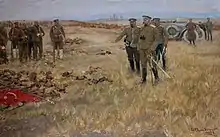| Battle of Erzincan Эрзинджанское сражение Երզնկայի ճակատամարտ Erzincan Savaşı | |||||||
|---|---|---|---|---|---|---|---|
| Part of World War I | |||||||
 Surrender of Turkish soldiers | |||||||
| |||||||
| Belligerents | |||||||
|
|
| ||||||
| Commanders and leaders | |||||||
|
|
| ||||||
| Strength | |||||||
| Russian Caucasus Army Greek Caucasus Division | Third Army | ||||||
| Casualties and losses | |||||||
| 12,000[1] | 34,000, of them 17,000 captured[2] | ||||||
The Battle of Erzincan (Russian: Эрзинджанское сражение, Turkish: Erzincan Muharebesi) was a Russian victory over the Ottoman Empire during the First World War.
In February 1916, Nikolai Yudenich had taken the cities of Erzurum and Trabzon. Trabzon had provided the Russians with a port to receive reinforcements in the Caucasus. Enver Pasha ordered the Third Army, now under Vehip Pasha, to retake Trabzon.[3] Vehip's attack failed and General Yudenich counterattacked on July 2.[3] The Russian attack hit the Turkish communications center of Erzincan forcing Vehip's troops to retreat as well as losing 34,000 men, half taken as POWs.[3] As a result, the Third Army was rendered ineffective for the rest of the year and Erzincan was captured by the Russians.[4]
Notes
- ↑ Allen W. E. D., Muratoff Paul. Caucasian Battlefields: A History of the Wars on the Turco-Caucasian Border 1828–1921. Cambridge University Press. 2011. p. 411.
- ↑ Boyd, Douglas (September 2014). Other First World War: The Blood-Soaked Eastern Front. ISBN 978-0750957861.
- 1 2 3 A Global Chronology of Conflict, Volume Four, ed. Spencer C. Tucker, (ABC-CLIO, 2010), 1625.
- ↑ David Eggenberger, An Encyclopedia of Battles: Accounts of Over 1,560 Battles from 1479 b.c. to the Present, (Courier Dover Publications, 1985), 137.
References
- Spencer C. Tucker(Editor), A Global Chronology of Conflict, Volume Four, ABC-CLIO, 2010.
- Erzurum-Erzincan